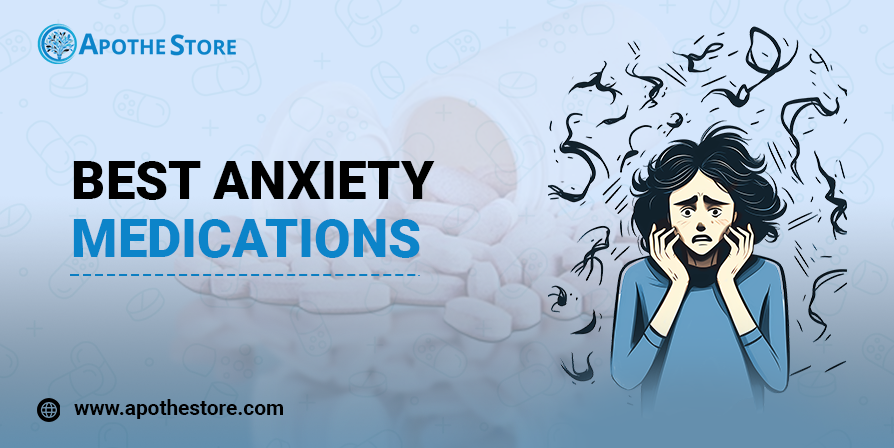Anxiety Medications: Costs and Side Effects
Anxiety is a common mental health condition that affects millions of people worldwide. For many, managing anxiety involves a combination of therapy, lifestyle changes, and medication.
Anxiety medications, prescribed to help manage symptoms, can be incredibly effective. However, they come with their own set of costs and side effects that are important to understand.
This blog will explore the financial aspects and potential side effects of anxiety medications, providing a comprehensive overview for those considering or currently using these treatments.
Understanding Anxiety Medications
Anxiety medications come in various forms, including benzodiazepines, antidepressants, and beta-blockers. Each type works differently to address symptoms of anxiety, such as excessive worry, restlessness, and physical symptoms like rapid heartbeat and sweating.
- Benzodiazepines: These are often prescribed for short-term relief of acute anxiety. Examples include Xanax (alprazolam) and Ativan (lorazepam). They work by depressing the central nervous system to produce a calming effect.
- Antidepressants: These are typically used for long-term management of anxiety. Selective serotonin reuptake inhibitors (SSRIs) and serotonin-norepinephrine reuptake inhibitors (SNRIs) are common examples. They help to balance chemicals in the brain that affect mood and anxiety levels.
- Beta-blockers: While not directly targeting anxiety, beta-blockers like propranolol are sometimes used to manage physical symptoms of anxiety, such as a racing heart.
Costs of Anxiety Medications
The cost of anxiety medications can vary widely based on several factors:
- Type of Medication: Generic versions of medications like SSRIs are often less expensive than brand-name drugs. For instance, generic fluoxetine (Prozac) is typically cheaper than its brand-name counterpart.
- Insurance Coverage: The extent of coverage can significantly impact out-of-pocket costs. Many insurance plans cover anxiety medications, but the level of coverage can vary, affecting how much you pay.
- Dosage and Duration: Higher dosages and long-term use can increase costs. Patients with chronic anxiety may require ongoing prescriptions, which can add up over time.
- Pharmacy Pricing: Different pharmacies may offer varying prices for the same medication. Shopping around or using discount programs can help reduce costs.
- Additional Costs: Doctor’s visits, therapy sessions, and other related expenses can add to the overall financial burden of managing anxiety.
Side Effects of Anxiety Medications
While anxiety medications can provide significant relief, they also come with potential side effects. Understanding these can help individuals make informed decisions about their treatment options.
Benzodiazepines:
- Drowsiness: Common and often beneficial, but it can affect daily functioning.
- Dizziness: This may cause lightheadedness, especially when standing up quickly.
- Dependence: Risk of developing a dependency if used for prolonged periods.
- Impaired Coordination: This can affect motor skills, increasing the risk of accidents.
Antidepressants:
- Nausea: Often occurs when starting a new medication but may subside over time.
- Weight Gain: Some individuals experience increased appetite and subsequent weight gain.
- Sexual Dysfunction: Can affect libido and sexual performance.
- Insomnia: This may cause difficulty falling or staying asleep.
Beta-Blockers:
- Fatigue: This can lead to feelings of tiredness or lethargy.
- Cold Extremities: May cause hands and feet to feel cold.
- Bradycardia: Slow heart rate can be a concern for some users.
- Digestive Issues: May cause stomach upset or digestive problems.
Managing Costs and Side Effects
To manage the costs and side effects of anxiety medications effectively, consider the following strategies:
- Consult Your Doctor: Regularly discuss your treatment plan with your healthcare provider. They can help adjust dosages or switch medications if side effects become problematic.
- Use Generic Versions: Opt for generic medications when available to reduce costs without compromising effectiveness.
- Explore Assistance Programs: Many pharmaceutical companies offer patient assistance programs or discounts for those who qualify.
- Monitor Side Effects: Keep track of any side effects you experience and report them to your doctor. They may recommend lifestyle changes or alternative treatments.
- Practice Self-Care: Complement medication with therapy, stress management techniques, and a healthy lifestyle to enhance overall effectiveness and reduce reliance on medications.
Conclusion
Anxiety medications can play a crucial role in managing symptoms and improving the quality of life for many individuals. However, understanding the associated costs and potential side effects is essential for making informed decisions about treatment.
By being proactive about managing these factors, individuals can work towards effective anxiety management that aligns with their needs and lifestyle. Always consult with healthcare professionals to tailor a treatment plan that best addresses both the financial and physical aspects of anxiety medication.

